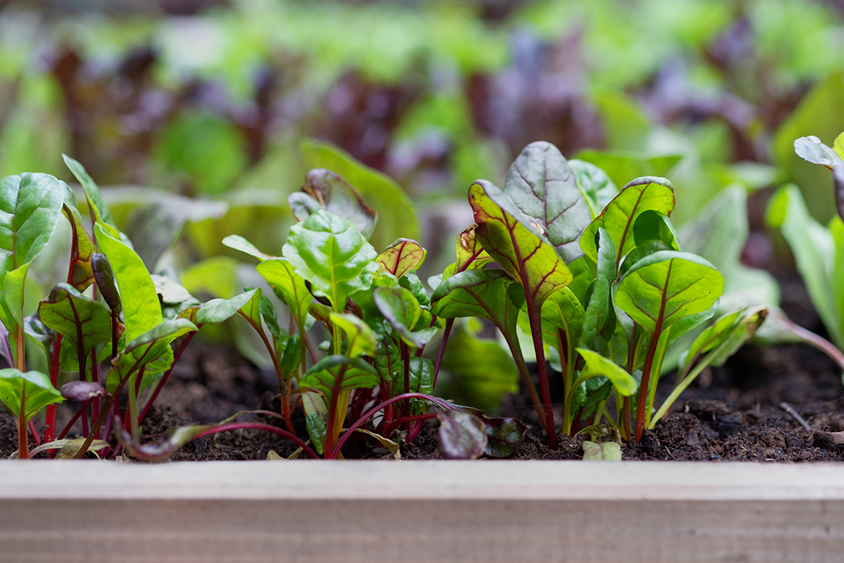
Spring has sprung, which means the rain and mud are making their annual return to Nova Scotia. This dramatic shift from our once snowy landscape brings with it a bouquet of seasonal delights: our beloved song birds, cruise ships filled with wide-eyed tourists, open lakes and waterways begging to be explored, rooftop patios, and, of course, the garden.
Last month, Central Library asked our community for their best gardening tips. The How Does Your Garden Grow? display board was filled with great advice and helpful hints from local horticulturalists.
Thank you for being a friend: Companion planting
Some plants just love each other! When grown together, or near each other, they can offer each other a number of benefits, like shade, pest resistance, additional nutrients, and greater yields.
For example, planting dill and basil with your tomatoes can protect them from hornworms. Planting tansy discourages cutworm, which is known to attack asparagus, beans, cabbage, peppers potatoes and many other veggies.*
Through companion planting, you can also learn about plants that do not like to grow beside one another, or are extremely invasive, and avoid problems down the road.
To learn more about companion planting, check out these resources:
Library resources:
Online resources:
*Almanac: Companion Planting Guide
Heeman's: Beginners Guide to Companion Planting
Country Living: Companion Planting
The right place at the right time: Making a schedule
Planting schedules are all about knowing when to plant. Schedules outline what seeds should be started inside instead of going right into the ground, and details about when to transfer into them to the garden. It also tells you the length of your growing season which can be very different from place to place.
For example, if you live in Halifax, you could transplant your bell pepper seeds as early as May 22. But if you live in Bridgewater, you should wait until after June 19. These dates are based on the last predicted frost for the year.*
To learn more about planting schedules, check out these resources:
Online resources
When to Plant Vegetables in Halifax
Nova Scotia School Garden Resource Guide
Taste of Nova Scotia: Spring Gardening Tips
Getting the cat to not come back: Controlling pests big and small
Pests in the garden can be a big problem, and controlling them can take a delicate balance. For example, oil sprays can be very effective against aphids and mites, but you don’t want to accidentally spray your neighbourhood bees. To avoid this mistake, it’s recommended that you spray the area early in the morning before the bees have become active for the day.*
Pests aren’t limited to insects. Your neighbour’s cat, or a local rabbit warren, can damage your plants with their digging and munching, however, there are ways to deter these creatures from frolicking in your garden. For example, cats do not like strong citrus scents, so putting orange peels in the garden can help keep them at bay.**
To learn more about pest control, check out these resources:
Library resources:
The Organic Gardener's Handbook of Natural Pest and Disease Control
Jerry Baker's Great Green Book of Garden Secrets
Online resources:
*Good Housekeeping: Organic Pest Control
**David Suzuki: How to keep cats out of the garden
Earth Easy: Natural Insect Pest Control
Farmers Almanac: Keep Pests Out of Your Garden Naturally
Food is an important part of a balanced diet: Fertilization and feeding
Plants are thought to have pretty basic needs. A little water, a little sunlight, and they should be good to go, right? For some plants, that might be enough, but for others, soil quality and fertilization are extremely important. Adding compost and other fertilizers to your soil gives your plants added nutrients, like phosphorus, which helps stimulate root growth.
Fertilizers can also help adjust the pH level of your soil. Most plants prefer a neutral pH level, but some plants—like blueberries—prefer an acidic soil.*
To learn more about fertilization, check out these resources:
Library resources:
Compost: How to Make and Use Organic Compost to Transform your Garden
The Complete Compost Gardening Guide
Online resources:
*How and Why to Fertilize Your Plants
A Gardeners Guide to Fertilizer
Plant Food: Don't Forget to Feed Your Plants
Whatever you grow, grow it with love: Final thoughts
A resounding theme in the tips we received through the How Does Your Garden Grow? display board was that of love. People who garden love what they do even when their tomatoes don’t ripen on time, even when their squash are tiny, even when nothing grows at all. It’s not about growing the biggest pumpkin—it’s about doing what you love and sharing it with the people you love. So, remember when you’re planting to feel those loving feelings.
Now get out there and get dirty!
Try out some of these tips and learn more at our upcoming gardening programs and workshops.

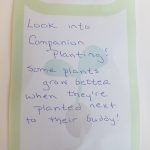









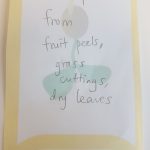

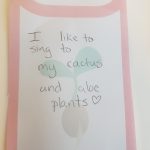

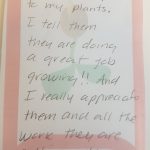


Add a comment to: How Does Your Garden Grow?